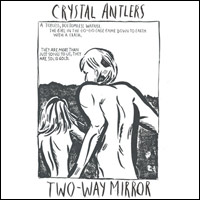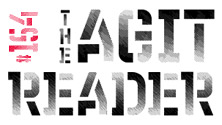
Player Piano
Carpark
Dayve Hawk’s first release as Memory Tapes, Seek Magic was beloved in certain circles—and with good reason. The album matched gauzy layers of synths with bubbling percussion, tambourines, and punchy electro-funk, as well as some murky found noises for good measure. It owed much to its predecessors, but was still entirely its own beast. Alas, the same can’t be said for Player Piano. It has its moments, but ultimately feels pretty slight compared to Hawk’s first effort.
Of course, it’s frustrating to compare an artist’s latest effort to his earlier projects; the artist only benefits when he’s managed to significantly elevate his game or take enough of a side-step that such comparisons are fruitless. With Player Piano, Hawk does neither. It has a more wistful feel, which sometimes translates as wispy, as on “Sunhits,” a pop tune so light it’s practically twee. On “Wait in the Dark,” and the much-blogged “Today Is Our Life,” Hawk plays it more straight than ever before, dialing down the urgent dancebeats for a feel that’s more summer afternoons in the sun than summer nights in the club.
I give Hawk credit for providing a good deal of variety, even in his somewhat limited palette. “Worries” has a kitschy, calypso feel that will remind you of Yeasayer. There are a couple of pastoral instrumental breaks, and the two-part “Fell Thru Ice” manages to achieve some real gravitas. Within the individual songs and also in the album as a whole, he’s taking you somewhere. It might be somewhere you want to go with him, but that’s the thing about memory: more likely you’ll feel like you’ve already been there and it was better the first time.
Matt Slaybaugh

Drums Between the Bells
Warp
Master producer and svengali of the avant garde Brian Eno reasserted himself last year with the superb Small Craft on a Milk Sea, perhaps his finest album since his benchmark ambient work in the ’80s. That record, like much of his best work, managed to merge his theoretical proclivities with sounds that worked on a gut-level, vacillating between the cerebral and the visceral. On his latest project, however, Eno is generally unsuccessful in balancing the yin and yang of his musical impulses, resulting in an album that’s far less listenable on any level.
Subtitled “Brian Eno and the Words of Rick Holland,” Drums Between the Bells is the fruit of a collaboration with the fairly obscure British poet that began in 2003. Here, Eno matches varied soundscapes with poems read by a handful of readers or himself. As such, there are three components to each track—the poem, the music and the voice—and it is only when all three elements work that the “song” is successful.
Drums starts off strongly enough with Eno’s pairing of bouncy electronics with erratic bouts of guitar and drums along with his own recitation of “Bless This Space.” The track is evocative for its stoicism, as is the subsequent “Glitch,” featuring Grazyna Goworek’s Germanic vocals. Elsewhere, “Dreambirds” fails on all fronts, with greeting card–quality prose read by Caroline Wildi matched to throwaway piano piddling. It is Wildi’s melodramatic reading of “Seedpods” that spoils some of the most adventurous sounds Eno creates on the entire album. “Sound Alien,” which contains the title phrase, starts out promising, with a riveting guitar riff cutting between glitched beats, but synthetic horns eventually take the track to a realm of jazz fusion. As one might sense, the album is thoroughly inconsistent. This wouldn’t be so problematic if Eno was pushing the envelope, but unfortunately, he is decidedly not.
Stephen Slaybaugh

Candidate Waltz
self-released
Will Johnson is hilariously prolific. Since forming Centro-matic in 1995, he’s managed to crank out nine albums and even more singles and EPs. At the same time, he’s released three albums with the Funkadelic to Centro-matic’s Parliament, South San Gabriel, and managed to release four solo records.
But with Johnson recently touring as a member of the Monsters of Folk, 2009 was the last time he released any music under any of his flags. For most people, two years is a fairly reasonable stretch between records, but in Johnson’s case, it’s unimaginable. Luckily for those who can’t imagine a world without Johnson, he rounded up the Centro-matic crew to record their 10th album, Candidate Waltz.
There was a fair amount of pre-release chatter that this Centro-matic record was going to be stripped down and to the point. For once the hype has proven to be true. It’s weird that it feels weird to hear a record so straightforward. That’s not to say that this is just the same ole, same ole, as there’s quite a bit of sonic diversity. There’s a couple songs which, with the addition of an overactive hi-hat, could almost be dance-punk tunes. Elsewhere, cuts like “Only in My Double Mind” are layered in guitar, lending an ethereal feel to them. The trick is that the band doesn’t try to do too much with any one song. The mood and movement of one track to the next makes sense and gives the album a feel more substantial than its modest 32-minute running time.
Johnson also decided to throw a curve ball with a lyrically narrative song. Like much of Johnson’s work, the majority of the album traffics in abstract, broken poetry. “All the Talkers” is the story of one night in “AnyBar USA” and the out-of-town band that wins the crowd over. For another band, it wouldn’t be notable, but for Centro-matic it feels like a big deal. It also doesn’t hurt that it’s one of the hookiest songs on an album lousy with them. It’s great to hear that even with so many records, Johnson and Centro-matic haven’ lessened in their consistency.
Dorian S. Ham

Two-Way Mirror
Recreation Ltd.
Things have certainly been interesting for the Crystal Antlers since the release of their debut LP, Tentacles, two years ago. The band was essentially orphaned after former label Touch and Go transitioned from the business of making new records to focusing solely on reissues. (Tentacles was the label’s last new release.) The Long Beach, California–based quintet still continued to tour extensively, and along the road it underwent a line-up change when its former organist left the band. All of this culminated with the group packing up and heading down to Mexico, where it recuperated in a barn in La Punta Banda and got to work on what became Two-Way Mirror.
The time south of the border seems to have been rejuvenating, as Two-Way Mirror is the band’s strongest work to date. Those familiar with the group will recognize the Crystal Antlers’ sound throughout the LP, with spacey guitar leads and vocalist Johnny Bell’s distinct wail floating above forceful psychedelic soundscapes containing elements of punk, salsa and experimental rock music. “By The Sawkill,” for example, sounds like classic Crystal Antlers: loud and powerful, with a mid-song shift into a quiet, almost dreamy passage. The bulk of the record, however, features music that is more nuanced and makes more prominent use of vocal melodies, and this poppier element has contributed to an even more sweeping and dynamic sound. This is especially present on songs like “Jules’ Story” and “Summer Solstice,” which seem to revel in their sweeping grandeur. Everything comes together with the strong album closer, “Dog Days,” a track that encapsulates the force and melody of the album in slowly building toward its rousing finale. With Two-Way Mirror, Crystal Antlers have reasserted themselves as one of the more interesting bands in modern rock.
Ron Wadlinger

Sound Kapital
Sub Pop
Dan Boeckner and his Handsome Furs bandmate/wife, Alexei Perry, lace their best songs with genuine heart-on-their-sleeves idealism. They’re not as needy as they used to be (after having some of their world travels funded by CNN), but on Sound Kapital they still sing “straight from the heart” (“When I Get Back”), chant about how to “do the right thing, baby” (“Damage”), and croon sentiments like “I feel alone, but it feels alright” (“Memories of the Future”). Hell, one of their songs is called “Serve the People.” Like a lot of modern pop, there’s more than a little Springsteen in those earnest choruses, but the Furs do all this over banging drums, thick synthesizers, and seriously huge hooks.
Their last album, Face Control, was trying a little too hard to be “rocking” and “fun,” and as a result, it paled in comparison to its predecessor, Plague Park, which still sounds monumental despite the mudslide of bands into Boeckner and Perry’s sonic space. This time around, though, they’re entirely unafraid of their own idiosyncrasies, and thus they’ve produced a bracing, body- and soul-stirring, synth-rock masterpiece that succeeds on its own merits without depending on period-piece nostalgia. Yes, if you close your eyes during tracks like “What About Us,” it won’t be difficult to picture yourself in a silky black shirt, stutter-stepping and swaying till 3am at Klub Mecca in the heart of Prague’s nightlife, but that’s not because the Handsome Furs are reaching for campy imitations. The album’s just authentically evocative.
If you listen closely to the lyrics, you’ll discover that Sound Kapital is in large part about the overwhelming perspective that seeing the world can lend you, and the added significance the plot of land you call home often gains upon your return. Boeckner kicks off the album by singing about a bittersweet reunion on “When I Get Back.” Then, in “Repatriated,” near the end of the record, he simultaneously laments and celebrates the liberation and separation you feel when you’ve seen too much or been away too long. By paying as much attention to what they’re saying as they do to how they’re saying it, and by crafting a musical backdrop that works as well thematically as it does viscerally, the Handsome Furs have made their most remarkable record yet and set a standard for their brethren that’s unlikely to be met anytime soon.
Matt Slaybaugh
MP3: “Repatriated”
ALBUM REVIEWS
Marianne Faithfull, Horses and High Heels
YACHT, Shangri-La
Wax Museums, Eye Times
Weird Al Yankovic, Alpocalypse
Ty Segall, Goodbye Bread
Seun Anikulapo Kuti & Egypt 80, From Africa with Fury: Rise
John Paul Keith, The Man That Time Forgot
Cassettes Won't Listen, EVINSPACEY
Jeff the Brotherhood, We Are the Champions
Elysian Fields, Last Night on Earth
Thee Oh Sees, Castlemania
Antipop Consortium, Knives from Heaven
Oneida, Absolute II
Nigeria 70—Sweet Times
